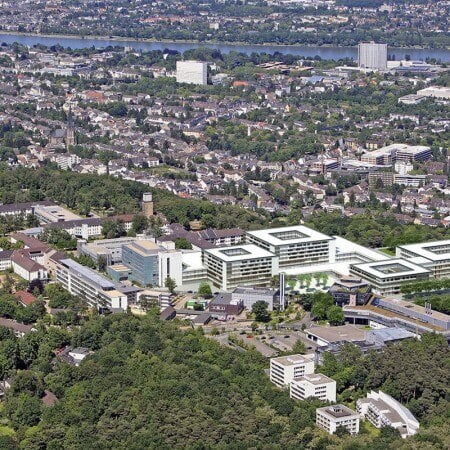Salmonellosis is one of the most common bowel infections caused by bacteria of the genus Salmonella. Children under the age of 6 are mostly affected by this infection. In most parts of the world, salmonellosis ranks first or second among the causes of diarrhea. This is a dangerous infection that, if severe, may cause pulmonary edema, toxic shock syndrome, kidney failure, DIC, and other life-threatening complications. In the case of a severe or complicated course, you can undergo your treatment of salmonellosis in Germany to save your life, avoid complications, and recover from a dangerous infection without any health consequences.
Content
- Etiotropic therapy
- Pathogenetic therapy
- Diet
Doctors carry out rehydration, which is the most important stage of treatment to avoid complications. Severe and complicated forms of the disease require antibiotic therapy. Diet and symptomatic drugs help to overcome the disease more easily.
You can undergo your treatment in one of the following hospitals: University Hospital Essen, University Hospital Ulm, or University Hospital Duesseldorf.
You are welcome to make your treatment appointment through the Booking Health service, and we will take care of the organization of your trip. Doctors at the Booking Health company will tell you about the best treatment methods and draw up a preliminary medical care program. The Booking Health managers will take care of getting a visa, insurance, flights and transfers, accommodation, interpreting services, and lack of overpayments at a hospital. A personal medical coordinator will always be in touch with you during your stay in Germany.
Etiotropic therapy
Although salmonellosis is a bacterial infection, antibiotic therapy is usually not required. The exception is severe and complicated forms of the disease. In the moderate form of the infection, antibiotics are used only in debilitated patients with comorbidities who have a high risk of complications.
The choice of antimicrobial agents depends on the strains of Salmonella that are prevalent in the geographic region. As a rule, doctors use nitrofurans, aminoglycosides, penicillins, or cephalosporins as starting agents. The treatment of severe forms is often started with fluoroquinolones or carbapenems.
The duration of the course of therapy is 7-14 days. Even before starting therapy, doctors take a bacterial culture to assess the sensitivity of Salmonella to antibiotics. On the 3-4th day, physicians receive data from an antibiogram. Whenever required, the therapy regimen is adjusted based on information about the sensitivity of bacteria to various antibacterial agents.
In severe and complicated forms of salmonellosis, two antibiotics can be used at once. Common combinations for initial treatment include aminoglycosides with fluoroquinolones or cephalosporins.
Most patients with severe salmonellosis suffer from vomiting, which makes oral antibiotic therapy quite challenging. In addition, patients have impaired function of the digestive tract, so not all drugs are completely absorbed into the bloodstream. Therefore, in the first few days of treatment, drugs are administered intravenously. After a patient's condition improves, therapy can be continued with oral antibiotics.
Pathogenetic therapy
Pathogenetic therapy for salmonellosis is more important than taking antibiotics. If a person does not receive antibiotics, they will still recover in a few days or a few weeks. However, if a person does not receive pathogenetic treatment, the disease can lead to severe complications and even death.
Pathogenetic therapy is aimed at:
- restoration of the volume of lost fluid and electrolytes with intravenous infusions of crystalloid solutions;
- prevention of complications;
- elimination of intoxication;
- symptom relief and normalization of the function of the organs of the digestive system.
The main thing in treating salmonellosis is adequate rehydration. The balance of fluid and electrolytes is restored by the oral administration of solutions whenever possible. If rehydration cannot be provided, for example, due to vomiting, the solutions are administered intravenously by drip.
Other drugs for pathogenetic treatment include:
- sorbents to remove toxins from the digestive tract;
- antispasmodics to eliminate spasm of the muscles of the digestive tract;
- pancreatin to treat impaired pancreatic function;
- dopamine receptor blocking agents to normalize the motility of the digestive tract and eliminate vomiting.
Diet
Diet is required only in the first few days after the onset of the disease, when the function of the gastrointestinal tract is impaired and the mucous membrane is inflamed. The diet does not cure salmonellosis, but it does make the disease easier to tolerate by relieving symptoms. Patients undergoing treatment in German hospitals are provided with proper nutrition, based on their clinical condition. Foods excluded from the diet are as follows:
- foods that stimulate peristalsis of the digestive tract;
- foods that increase bile production;
- foods that cause fermentation in the intestines;
- foods that mechanically irritate the mucous membrane.
The diet consists of soups, pureed vegetables, low-fat baked meat, boiled fish, and dried bread. Pickles, marinades, foods rich in vegetable fiber, muffins, milk, fatty and spicy foods are excluded.
You can go to Germany to undergo your diagnostics, treatment, and rehabilitation for salmonellosis. You are welcome to use the Booking Health service to see the cost of treatment, select the most suitable medical center, and make your treatment appointment at the best price. The employees of the Booking Health company will help you to select a clinic in Germany and organize your trip as soon as possible.
Authors:
The article was edited by medical experts, board-certified doctors Dr. Nadezhda Ivanisova and Dr. Sergey Pashchenko. For the treatment of the conditions referred to in the article, you must consult a doctor; the information in the article is not intended for self-medication!
Sources:
Centers for Disease Control and Prevention
Verywell Health
Mayo Clinic




















